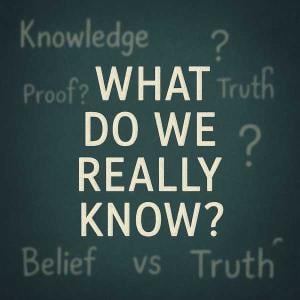
What Is “Knowledge?”
I have discussed here before my views about truth, certainty, and doubt. I will now tackle “knowledge.” What counts as knowledge? When can I claim that I know something?
The question has interested philosophers for centuries and millennia. It’s a crucial aspect of the branch of philosophy called “epistemology.”
I once worked for an evangelist who often said, “I know that I know that I know.” That was his answer to any question about what he claimed to know and teach. He simply knew. But when should we accept as knowledge a truth claim?
Some philosophers, especially in my reading, Alvin Plantinga and Nicholas Wolterstorff, define “knowledge” as “justified true belief.”
How Do You Know That?
Let me unpack that. All truth claims are beliefs. I believe the Earth is relatively round, not flat. But when does a belief count as knowledge? Only when it is justified. That becomes important especially when I (or you) want someone

else to agree.
I have beliefs that are not justified; I just believe them. But when I ask someone else to agree, I need to provide justification—at least insofar as they ask “How do you know that?” If all I can say is “I know that I know that I know” I shouldn’t be disappointed if they want more.
A belief without justification is either an opinion or a mere belief and it’s difficult to distinguish the two. I would say an opinion is subjective while a belief can be and usually is more than merely subjective. A belief, for example, may arise from a persuasive personal experience or trust in someone else’s authority or knowledge.
They Were Not True
The debate about the “how” of justifying truth claims so that they count as knowledge is a secondary matter here. Before getting into that, we need to agree, if possible, that “knowledge” is justified true belief.
Why the “true” in “justified true belief?” A belief may be justified and yet turn out not to be true. Then it was not knowledge. In the distant past, most people believed the earth to be flat. And that the sun revolved around the earth. Those beliefs were justified by observation. Better observation falsified those beliefs. They counted as knowledge “then,” but later turned out not to have been knowledge because they were not true.
So, “knowledge” is, simply put, justified true belief.
UFOs Are Real, Maybe
Unfortunately, popular thought and language differentiate between “belief” and “knowledge.” “Knowledge” is widely believed (no pun intended) to be what is provable either a priori or a posteriori. We now know that very little can be proven beyond any shadow of doubt a posteriori. But much can be known a posteriori—insofar as “known” means justified and not merely believed without justification.
I believe that UFOs are real. At least some days. But I don’t know they are real. I can’t justify my belief that UFOs are real. I can appeal to certain evidence and arguments and testimonies, but none of them add up, for me, to justification. Therefore, I do not claim my belief in UFOs (on some days) as knowledge.
Intersubjective Justification
What it would take to transform my occasional belief in UFOs from mere belief to knowledge is uncertain. I suppose that would happen if I were to see unrefutable evidence, such as seeing with my own eyes, a UFO that could not be something else. Or, possibly, a video of one that could not be denied. I’m not sure what that would be. So far I have not seen any.
All that raises many questions, of course, especially for religion. What counts as “knowledge” in religion? Wittgensteinian fideists like D. Z. Phillips argue that what counts as knowledge in religion is unique to religion. I’m not prepared to go there. Pannenberg has influenced me too much! Plantinga and Wolterstorff argue that belief in God is “properly basic”—like belief in other minds or that I am not right now dreaming. Again, I’m not prepared to go there. I think that the claim that God exists must and does have intersubjective justification. I have much good company. Obviously. I could name many philosophers who agreed and agree. But that’s for another essay.
*Note: If you choose to comment, make sure your comment is relatively brief (no more than 100 words), on topic, addressed to me, civil and respectful (not hostile or argumentative), and devoid of pictures or links.*













